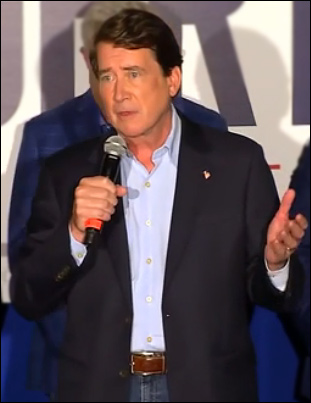By Jim Ellis
Aug. 10, 2020 — Former US Ambassador to Japan Bill Hagerty won the Tennessee Senate Republican nomination last Thursday night with a 51-39 percent victory margin over his chief opponent, Dr. Manny Sethi, a Nashville surgeon, in the nation’s only Thursday primary.Now as the official Republican nominee, Hagerty becomes the prohibitive favorite in the general election against businesswoman and environmental activist Marquita Bradshaw, who was an upset winner in the Democratic primary despite spending virtually no money on her campaign.
The last three publicly released Republican primary polls, from JMC Analytics, the Trafalgar Group, and Victory Phones, all forecast a 3-4 point edge, far below Hagerty’s actual percentage spread. The Tarrance Group, which polled at the end of June, was much closer to the final result, predicting a 46-29 percent split in Hagerty’s favor. The surveys, however, were completed through July 19, so it is possible that his late message blitz was responsible for Hagerty gaining strong momentum in the campaign’s final stage that led to a strong victory.
The Democratic side actually became more curious. Attorney James Mackler, who raised and spent more than $2 million and was viewed as a heavy pre-election favorite for Thursday night’s vote, not only lost to Bradshaw, but placed a poor third. In between Bradshaw and Mackler was attorney and Unitarian minister Robin Kimbrough. Together, she and Bradshaw are reporting spending only $17,000 on their combined political effort through the July 17 pre-primary financial disclosure period.
The Republican primary turned into a hard-fought battle between Hagerty, who spent over $9 million, and Dr. Sethi, who was making his first venture into elective politics. Sethi raised and spent well over $4 million. The contest was personal at the end, with both candidates trying to get to the right of the other and launching negative attacks. Hagerty had President Trump and Sen. Marsha Blackburn’s (R) combined endorsement, signaling that he had the conservative credentials necessary to win a Tennessee Republican primary.
East Tennessee Rep. Phil Roe (R-Johnson City) is retiring after serving what will be six complete terms and his successor will be pharmacist and political activist Diana Harshbarger.
The new Republican nominee ran a red meat message campaign, cloaking herself in supporting President Trump, and coming out hard in favor of law and order and building the wall between the US and Mexico. She batched her four main opponents together as being “snakes in the swamp” because all are elected officials. With only a little over 19 percent of the vote, Harshbarger was able to overcome 13 other Republican candidates to secure the party nomination with a small plurality, which, in this district, is tantamount to winning the general election.
Harshbarger spent the most money on her campaign, over $1.3 million, almost all of which was self-funded. She will have little trouble securing this 77 percent Trump district in the fall. The new Democratic nominee is Blair Walsingham, a farmer and US Air Force veteran, but a candidate who only raised $40,000 for her primary effort.
The only other primary of note occurred in Nashville, where veteran Rep. Jim Cooper (D) was being challenge for the Democratic nomination. The congressman outspent his top opponent by more than a 7:1 ratio, which earned him a 57-40 percent victory and another term in the House. Republicans filed no candidate this year in the 5th District, meaning last night’s vote re-elected Cooper to a 16th non-consecutive term.
Congressman Cooper was first elected to represent the Middle Tennessee 4th District in 1982 and served until embarking upon his unsuccessful US Senate bid in 1994 when he lost to then-Sen. Fred Thompson (R). He returned to the House with his first 5th District win in 2002.
Reps. Tim Burchett (R-Knoxville), Chuck Fleishmann (R-Chattanooga), Scott DesJarlais (R-Sherwood), John Rose (R-Cookeville), Mark Green (R-Clarksville), David Kustoff (R-Germantown), and Steve Cohen (D-Memphis) all won their respective nominations either as an unopposed candidate or recording at least 71 percent of the vote. Each man will cruise to re-election in November.

